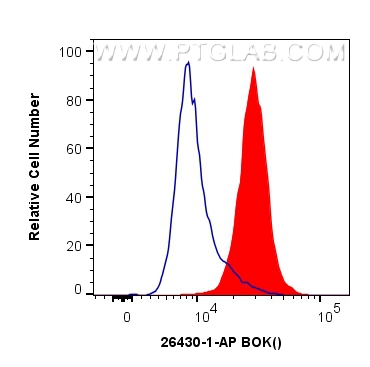验证数据展示
经过测试的应用
| Positive WB detected in | HepG2 cells |
| Positive FC (Intra) detected in | MCF-7 cells |
推荐稀释比
| 应用 | 推荐稀释比 |
|---|---|
| Western Blot (WB) | WB : 1:500-1:2000 |
| Flow Cytometry (FC) (INTRA) | FC (INTRA) : 0.40 ug per 10^6 cells in a 100 µl suspension |
| It is recommended that this reagent should be titrated in each testing system to obtain optimal results. | |
| Sample-dependent, Check data in validation data gallery. | |
产品信息
26430-1-AP targets BOK in WB, FC (Intra), ELISA applications and shows reactivity with human samples.
| 经测试应用 | WB, FC (Intra), ELISA Application Description |
| 经测试反应性 | human |
| 免疫原 | BOK fusion protein Ag24070 种属同源性预测 |
| 宿主/亚型 | Rabbit / IgG |
| 抗体类别 | Polyclonal |
| 产品类型 | Antibody |
| 全称 | BCL2-related ovarian killer |
| 别名 | BCL2L9, hBOK, BOKL, Bcl-2-related ovarian killer protein, Bcl-2-like protein 9 |
| 计算分子量 | 23 kDa |
| 观测分子量 | 23 kDa |
| GenBank蛋白编号 | BC006203 |
| 基因名称 | BOK |
| Gene ID (NCBI) | 666 |
| RRID | AB_3085869 |
| 偶联类型 | Unconjugated |
| 形式 | Liquid |
| 纯化方式 | Antigen affinity purification |
| UNIPROT ID | Q9UMX3 |
| 储存缓冲液 | PBS with 0.02% sodium azide and 50% glycerol , pH 7.3 |
| 储存条件 | Store at -20°C. Stable for one year after shipment. Aliquoting is unnecessary for -20oC storage. |
背景介绍
BOK belongs to the BCL2 family, members of which form homo- or heterodimers, and act as anti- or proapoptotic regulators that are involved in a wide variety of cellular processes. Studies in rat show that this protein has restricted expression in reproductive tissues, interacts strongly with some antiapoptotic BCL2 proteins, not at all with proapoptotic BCL2 proteins, and induces apoptosis in transfected cells. Thus, this protein represents a proapoptotic member of the BCL2 family.
实验方案
| Product Specific Protocols | |
|---|---|
| WB protocol for BOK antibody 26430-1-AP | Download protocol |
| Standard Protocols | |
|---|---|
| Click here to view our Standard Protocols |

